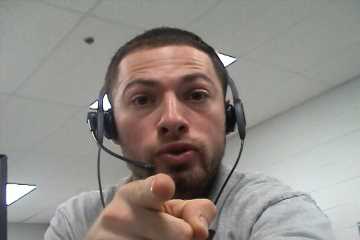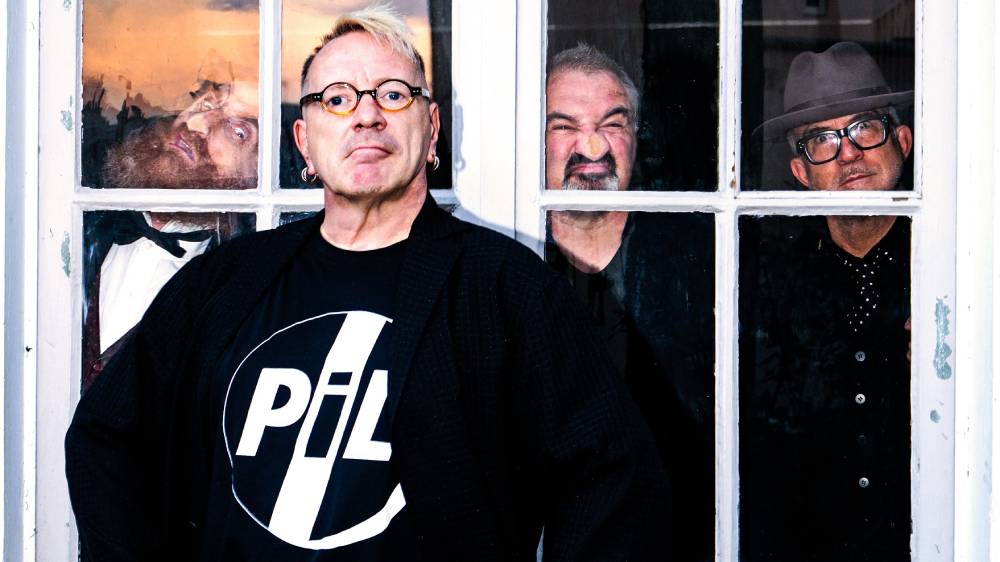“Telemarketers” may be summer TV’s oddest thrill ride. Co-director Sam Lipman-Stern begins the three-part docuseries, which launches August 13 on HBO, in retrospect. He’s looking back at the footage he shot of his time working for telemarketing firm CDG (short for Civic Development Group) two decades ago. Then a teenager, Lipman-Stern recorded everything: The aggressive sell he and his colleagues made over the phone to solicit donations for what the callers claimed were police charitable unions, as well as the freewheeling culture that permeated throughout the office. Closer to the present day, he and co-director Adam Bhala Lough reconnect with Lipman-Stern’s former colleague Pat Pespas to delve into how the system has morphed since they first worked together, and how they might be able to use what they’ve learned from their years of calling strangers to take it down.
Backed by high-profile executive producers including Benny and Josh Safdie and Danny McBride, “Telemarketers” is a singular thing: What begins as a “Wolf of Wall Street”-style extravaganza of in-office revelry and red-hot sales becomes a political thriller, then a crash course in the economics of scamming and an almost melancholy portrait of how challenging it is for activists to make real change. Lipman-Stern and Bhala Lough, co-directors who are incidentally related by marriage, spoke to Variety about “Telemarketers” and the change they hope it makes.
What made you decide to record footage of the CDG office two decades ago? Did you know then it’d make for a good documentary?
Lipman-Stern: I naturally gravitated towards filming from a young age. From about 13, when I got my first camcorder, I was always the kid in my group of friends that had the camcorder rolling. I didn’t even think about it in terms of the future — it was just, “I have access to a camcorder, I’ve got to film.”
As I got older, I really did want to become a filmmaker. That seed was what got me filming at CDG: “I’ve got to document this place.” Originally, we just put videos on YouTube, documenting the shenanigans in the office. It was also a way to kill time at a boring, weird job.
How did you get started working there?
Lipman-Stern: I left high school in ninth grade. And my parents said, “If you’re going to be out of school, you have to get a job.” I tried to apply at Burger King and McDonald’s, and they said I was too young. A buddy of mine told me about this telemarketing office — he was 15 at time time, and he was working there and said, “They’ll definitely hire you.” We rode our bikes over, and they had me read the script, and they hired me on the spot.
I remember the first day, there were all these big, built dudes doing push-ups next to the bathroom; there were mug shots of some of the callers on the wall — just for entertainment, they would print them out. There were some teenagers like me, and then there were mostly ex-convicts. On your left, you’d have a murderer; on your right, you’d have literally the biggest heroin kingpin in New Jersey. People were selling drugs out of the office, there was prostitution in the office. But we are raising money for police organizations over the phone.
Was there a certain competitive spirit in getting really good at reading the script and wheedling money out of people?
Lipman-Stern: There was. We only made ten bucks an hour. There were no commissions. But they kept the environment really competitive. You had to make $200 an hour [in donations], or they would send you home. If you get sent home three times, you’re done. They would put your name on a board for the people who got the most sales — I was always on that board. There is a dopamine hit when you get a sale, because there’s a skill element involved in it. They taught me how to sound like a cartoon caricature of a cop when I was fourteen.
How did you get your former colleagues to speak so candidly?
Bhala Lough: That’s all Sam. Sam was coming from the inside. He’s one of them — he’s able to talk the talk and walk the walk of the telemarketer, and they trust him.
Lipman-Stern: CDG was a dysfunctional family. You could not see these people for ten years, but when we see each other, it’s like no time has passed.
Given your insider’s view of the industry, do you think telemarketing scams have gotten more sophisticated since your time working at CDG?
Lipman-Stern: That was the most surprising thing. We were blown away to find out that the scam has evolved into something yet crazier and more Wild West. You have robo-calls, you have virtual call centers where people are calling from all over. It’s less regulated, and there’s more money.
You show, in “Telemarketers,” how Sen. Richard Blumenthal (D-Conn.) has been fighting these practices throughout his career. And yet progress seems incremental at best. Why is it so hard to get action on this?
Bhala Lough: Both sides, on the left and the right, the politicians benefit from these practices.
Lipman-Stern: The telemarketing companies, along with a lot of these police groups, figured out the new loophole — with PACs [political action committees], it’s even less regulated. They’re doing the same calls, the same scripts, but they changed the tax code to PACs. The politicians don’t want to tighten the regulations on PACs because that will hurt their funding. So it’s really kind of genius.
Bhala Lough: The telemarketing companies are taking advantage of the larger problem of scam PACs. Scam PACs have been covered by the press a lot, but people don’t realize that there’s a connection there between the scam PACs and the telemarketers.
Without giving too much away, the series includes you making contact with Sen. Blumenthal. Was this guerrilla filmmaking, or did he know he was going to be featured in the documentary?
Bhala Lough: That was all vetted, it took months to come together. I have a lot of respect for him taking time out to be on camera. We’ve reached out to him repeatedly since that meeting, and we followed up with 80 pages of documents about this scam. I hope that when this comes out, the Senator and his staff will take a look at those documents, and grant us what we asked for — for Pat to testify in front of Congress as a whistleblower.
I know that sounds crazy when you watch the show with all the jokes and the humor, but we’re dead serious. The goal was for Senator Blumenthal to vouch for us and say we need a hearing on this. I firmly believe the Senator, who has done great work in this field, will take a look at the material and will grant us a hearing.
Beyond that, what impact are you hoping for with “Telemarketers”?
Bhala Lough: My hope is that after seeing this, people will be like “Grandma, I saw this show on HBO and you shouldn’t be giving to those places anymore.” That’s the simple act of educating. I think reaching a large swath of people through entertainment is more powerful than some local news report that has been done ad infinitum in the past and never really made a dent.
One thing that really struck me watching “Telemarketers” is that it’s a story of scammers — everyone’s trying to get one over on everyone else. And our culture seems to have moved, hard, in that direction in the years since you worked at CDG.
Lipman-Stern: One of the things that we wanted to show is that it’s not the callers — the callers are just trying to do a job. They’re just people that are down on their luck, or they have a criminal history. We wanted to give them the ability to tell the story. It’s the heads of these companies that could make the change in this industry. When we started calling for cancer charities, one of the biggest scam cancer charities was the Cancer Fund of America. It got taken down, but it was one of our biggest clients at the time. My grandparents died of cancer. It made me really think: The American public is very generous. Hundreds of millions of dollars are being donated, and then basically just disappearing — poof. It’s gone. Hopefully, this story can help that money go to actual good causes.
Bhala Lough: I was looking at our pitch deck we sent to HBO. There’s a line in it that says “In this country, you either hustle or be hustled. There is no in-between.”
Read More About:
Source: Read Full Article


